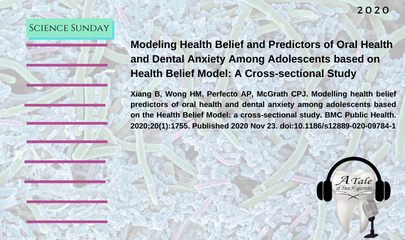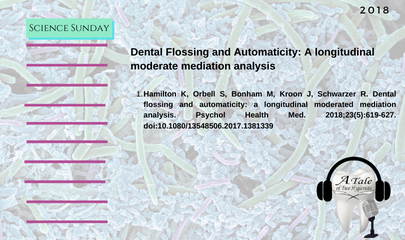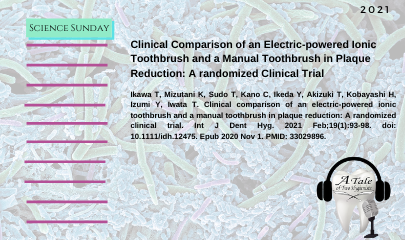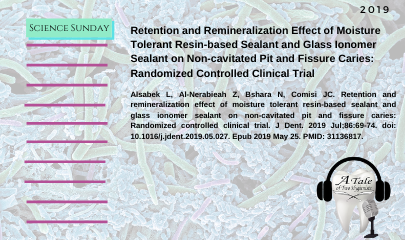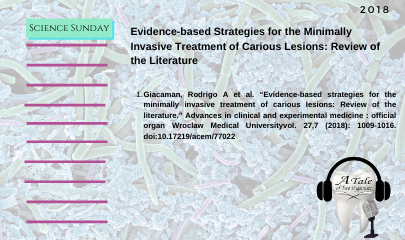Mechanical removal of plaque and biofilm is necessary to prevent oral diseases such as dental decay and periodontal disease. Patient’s ability to perform tasks is essential in the proper plaque control. A recent study published in 2019 in the British Dental Journal aimed to “evaluate dexterity and … [Read more...] about Clinical Relevance of Dexterity in Oral Hygiene – Science Sunday
Improving Oral Care for Hospitalized Patients: Choosing Appropriate Products – Science Sunday
Oral care and hygiene are very important for patients that are hospitalized as well as those with underlying systemic diseases that may land them in the hospital. Very few hospitals, if any, employ dental hygienists to lead the charge in this area of care, therefore it is imperative that dental … [Read more...] about Improving Oral Care for Hospitalized Patients: Choosing Appropriate Products – Science Sunday
Modeling Health Belief and Predictors of Oral Health and Dental Anxiety Among Adolescents based on Health Belief Model: A Cross-sectional Study – Science Sunday
A hypothesis that a vicious cycle exists between dental anxiety, oral health and oral health status has been proposed by multiple researchers that focus on this area of research. As clinicians, many of us have seen this firsthand. A recently published cross-sectional study in the journal BMC Public … [Read more...] about Modeling Health Belief and Predictors of Oral Health and Dental Anxiety Among Adolescents based on Health Belief Model: A Cross-sectional Study – Science Sunday
Dental Flossing and Automaticity: A longitudinal moderate mediation analysis – Science Sunday
There is no question, most people floss less than recommended and, in some cases, not at all. Emerging research indicates that self-regulatory and automatic factors play a role in oral hygiene behaviors. A study published in 2018 in the journal Psychology, Health & Medicine investigated “the … [Read more...] about Dental Flossing and Automaticity: A longitudinal moderate mediation analysis – Science Sunday
Clinical Comparison of an Electric-powered Ionic Toothbrush and a Manual Toothbrush in Plaque Reduction: A randomized Clinical Trial – Science Sunday
Controlling plaque accumulation is imperative to good oral health. Plaque accumulation leads to inflammation that can cause dental disease if not managed properly. In a clinical trial published in 2021 in the International Journal of Dental Hygiene the authors aimed to “evaluate the plaque removal … [Read more...] about Clinical Comparison of an Electric-powered Ionic Toothbrush and a Manual Toothbrush in Plaque Reduction: A randomized Clinical Trial – Science Sunday
Microcavitated (ICDAS 3) Carious Lesion Arrest with Resin or Glass Ionomer Sealants in First Permanent Molars: A Randomized Controlled Trial – Science Sunday
Microcavitated (ICDAS 3) Carious Lesion Arrest with Resin or Glass Ionomer Sealants in First Permanent Molars: A Randomized Controlled Trial A main strategy for minimally invasive treatment (MIT) for carious lesions is sealants. Sealing non-cavitated carious lesions has shown to be … [Read more...] about Microcavitated (ICDAS 3) Carious Lesion Arrest with Resin or Glass Ionomer Sealants in First Permanent Molars: A Randomized Controlled Trial – Science Sunday
Retention and Remineralization Effect of Moisture Tolerant Resin-based Sealant and Glass Ionomer Sealant on Non-cavitated Pit and Fissure Caries: Randomized Controlled Clinical Trial
Dental sealants have been used as a preventative for dental caries, retention and marginal integration are key to decreasing the incidence of caries in pit and fissures that have been sealed. It has been postulated that the adoption of pit and fissure sealants as a part of minimally invasive … [Read more...] about Retention and Remineralization Effect of Moisture Tolerant Resin-based Sealant and Glass Ionomer Sealant on Non-cavitated Pit and Fissure Caries: Randomized Controlled Clinical Trial
Evidence-based Strategies for the Minimally Invasive Treatment of Carious Lesions: Review of the Literature – Science Sunday
Evidence-based Strategies for the Minimally Invasive Treatment of Carious Lesions: Review of the Literature Treatment of carious lesions is currently solely restorative. Other minimally invasive treatments are great alternatives for managing carious lesions. A recent review published in 2018 … [Read more...] about Evidence-based Strategies for the Minimally Invasive Treatment of Carious Lesions: Review of the Literature – Science Sunday


